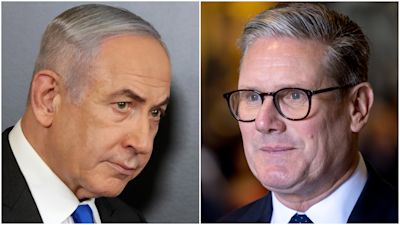Netanyahu says Starmer's 'misguided' Labour party has 'undermined' Israel

Benjamin Netanyahu has accused the UK Government of sending “mixed messages” over its support for Israel and “undermining” the country’s right to self-defence.
Israel’s prime minister criticised the new Labour administration for suspending around 30 arms exports to Israel amid concerns they could be used in violations of international humanitarian law in the Gaza conflict.
Prime Minister Sir Keir Starmer has also dropped the previous Conservative government’s plan to challenge the International Criminal Court’s (ICC) application for an arrest warrant against Netanyahu.
Netanyahu dismissed the threat of arrest warrants against him as “preposterous”.
Israeli forces withdraw from West Bank refugee camps but warn 'operation' not over
Speaking to the Daily Mail on Wednesday, Netanyahu said: “After the October 7 Hamas massacre, the previous British government was clear in its support. Unfortunately, the current government is sending mixed messages.
“They say that Israel has the right to defend itself, but they undermine our ability to exercise that right both by reversing Britain’s position on the absurd allegations made by the ICC prosecutor against Israel and by blocking weapons sales to Israel as we fight against the genocidal terrorist organisation that carried out the October 7 massacre.”
Earlier this month, the UK government announced they would suspend some arms export licences to Israel due to a "clear risk" they could be used to "commit or facilitate a serious violation of international humanitarian law".
Foreign Secretary David Lammy announced 30 out of 350 arms export licences to Israel will be suspended, however he stressed this is "not an arms embargo" nor a blanket ban.
Business and Trade Secretary Jonathan Reynolds has defended restrictions on UK arms exports to Israel as "fair" and "proportionate".
The UK suspended some arms export licences to Israel earlier this month over concerns the country is violating international humanitarian law in Gaza.
Reynolds told LBC: “The findings that were passed to me from the Foreign Office, from the Foreign Secretary, that there was a risk that Israel was not complying with international humanitarian law in relation to detainees and access to aid, mean that I have to act."
He said the limitations only apply to the conflict in Gaza, meaning Israel can still use the weapons in other parts of the territory, including against militant group Hezbollah in Lebanon.
“The decision we took was fair, was proportionate, was consistent with international law, and fundamentally what we need, what everyone needs in the Middle East, is a ceasefire in that conflict," he continued.
Netanyahu's comments also come after at least 20 people were killed and more than 450 were injured after walkie-talkies used by Hezbollah in Lebanon exploded.
Exploding electronic devices were reported in multiple regions of Lebanon, including at a funeral in southern Beirut for a child and three Hezbollah members killed by exploding pagers the day before.
The newly delivered pagers were given to Hezbollah to help communicate without using telecommunications that could be intercepted by Israel.
Israel has not commented specifically on the blasts, but on Wednesday, Israel's Defence Minister Yoav Gallant announced "a new phase in the war".
“We are at the start of a new phase in the war – it requires courage, determination and perseverance,” he said.
Israel’s army chief, Herzi Halevi, added that his country has “many capabilities” that have not yet been “activated”.
It is unclear whether Hezbollah will retaliate, though the group's leader, Hassan Nasrallah, is set to give a televised speech on Thursday.
Subscribe free to our weekly newsletter for exclusive and original coverage from ITV News. Direct to your inbox every Friday morning.
The latest conflict between Israel and Hamas began on October 7 when Hamas killed over 1,100 people in Israel and abducted over 250. Some 97 hostages remain unaccounted for, thought either to be dead or still in Hamas captivity.
Since then, 41,000 people have died in Gaza, according to the Hamas-run health ministry.
International efforts to mediate a cease-fire have repeatedly stalled as each side accuses each other of making additional and unacceptable demands.
Want a quick and expert briefing on the biggest news stories? Listen to our latest podcasts to find out What You Need To know...